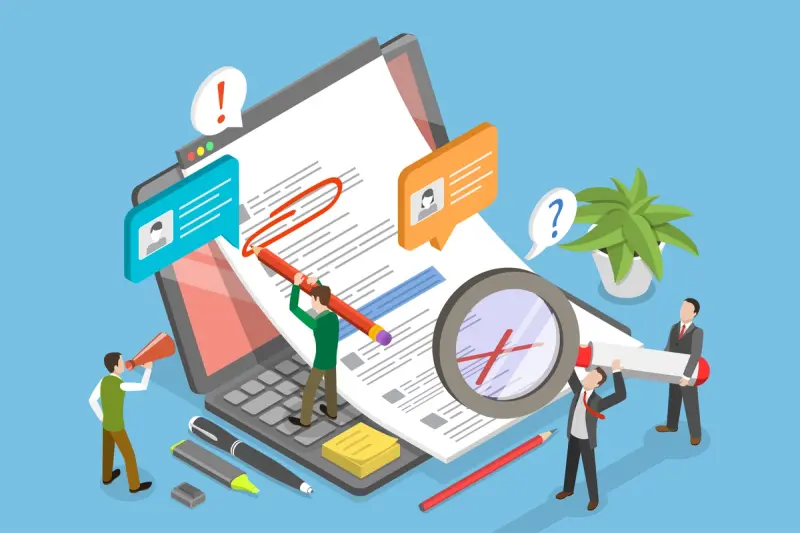Riley Kooh
Updated March 01, 2024
7 min
Smart vs. Traditional Contracts for Legal & Courts
Riley Kooh

Summary
In the ever-evolving landscape of technology, smart contracts have emerged as the latest and greatest way in which transactions and agreements are executed. These self-executing contracts, built on blockchain technology, bring a new level of efficiency, transparency, and security to various industries, like fintech, banking, healthcare, and legal sectors. In this blog post, we'll explore the concept of smart contracts, delve into their specific applications within the legal industry, and discuss how Apryse SDKs can optimize traditional contracts to offer streamlined human-legible contracts in conjunction with smart contracts.
What Are Smart Contracts?
Smart contracts introduce a modern approach to processing legal documents. Unlike a traditional contract that requires manual interaction to edit, review, execute, etc., a smart contract is a computer program that automatically executes, enforces, or verifies the terms of a contract when predetermined conditions are met.
Key Components of Smart Contracts:
- Code: Smart contracts are written in programming languages like Solidity (for Ethereum) or Chaincode (for Hyperledger Fabric). This code defines the rules and conditions of the contract.
- Decentralized Network: Smart contracts operate on decentralized blockchain networks, such as Ethereum or Binance Smart Chain. This ensures that no single entity has control over the contract, enhancing security and trust.
- Immutable Ledger: Once deployed, smart contracts are recorded on a tamper-proof blockchain ledger. This immutability ensures that the terms of the contract cannot be altered or tampered with.
Smart Contracts in the Legal Industry
The legal industry, notorious for its paperwork and cumbersome processes, has lawyers spending an average of 11 hours a week just searching for/processing documents. In an effort to reduce this; the legal sector has embraced smart contracts to streamline operations, reduce costs, and maintain security. With countless potential applications, we narrowed down to the top five examples of how smart contracts are being utilized in the legal sector:
1. Automated Contract Execution
Based on its prewritten protocols, Smart contracts autonomously execute agreements based on predefined conditions, diminishing the necessity for manual intervention and expediting the contract lifecycle.
Example: Intellectual Property Licensing
Smart contracts automatically distribute royalty payments to content creators based on the number of downloads, views, or other predefined criteria, ensuring prompt and transparent compensation.
2. Asset Tokenization
Legal documents often involve asset transfers. Smart contracts facilitate the tokenization of these assets, symbolizing them on the blockchain, ensuring a transparent and traceable ownership transfer.
Example: Real Estate Tokenization
When a property undergoes tokenization, the shares are represented via blockchain-based tokens. Investors can acquire and trade these tokens for fractional ownership. Smart contracts effectively distribute the appropriate proportion of returns to token holders based on their stakes.
3. Digital Notary Services
Smart contracts can function as digital notaries by timestamping and authenticating documents on the blockchain, thereby elevating the integrity and authenticity of legal documents.
Example: Patent Filing
Smart contracts offer a viable option for timestamping and validating patent documents on the blockchain. This establishes a version history of the patent filing process for transparency during legal proceedings.
4. Decentralized Escrow Services
In transactions necessitating an intermediary, smart contracts can serve as decentralized escrow services. Funds are automatically disbursed upon meeting agreed-upon conditions, mitigating the risk of fraudulent activities.
Example: Online Marketplaces
Within an online marketplace, the buyer can deposit funds into a smart contract, which then triggers the funds to be released to the vendor upon confirmation.
5. Dispute Resolution
The transparency and immutability inherent in blockchain technology make smart contracts an invaluable tool for dispute resolution. The complete history of the contract is visible on the blockchain, creating an indisputable record.
Example: Resolution of Disputes between Freelancers and Clients
Using a smart contract for a freelance agreement, specific milestones and deliverables are outlined. In instances of dispute, the blockchain reveals the entire project history, encompassing communications and completed tasks.
How Smart & Traditional Contracts Work Together

While smart contracts offer a new approach to automating the execution of agreements, traditional documents like PDFs are commonly used for static, human-readable representations of contracts, serving purposes like sharing, archiving, and presenting finalized agreements.
PDFs can be used in conjunction with smart contracts to enhance the overall efficiency, accessibility, and legality of digital agreements. There are several ways in which PDFs complement smart contracts:
Document Representation
PDFs: Act as a static, visual representation of the contract. PDFs are widely recognized for their fixed formatting, making them suitable for sharing and presenting contracts in a readable format.
Human-Readable Contracts
PDFs: Provide a human-readable format for individuals to review, understand, and manually verify the terms and details of the contract.
Contract Drafting and Review
PDFs: Preferred for initial drafting and legal review stages. Lawyers and stakeholders often work with PDFs during the contract creation process due to their standardization and compatibility.
E-signatures and Approval
PDFs: Often integrated with e-signature platforms, allowing parties to sign and approve the human-readable contract representation. The signed PDF can serve as evidence of consent and acceptance.
Document Management
PDFs: Used for offline storage, sharing, and archiving. Many document management systems incorporate PDFs to store finalized versions of contracts in a non-editable format.
Legal Compliance
PDFs: Used to ensure legal compliance and documentation. For instance, jurisdictions may require contracts to be presented in a specific format, and PDFs can fulfill these requirements.
Communication and Collaboration
PDFs: Used in communications between parties. Collaborators can share PDF versions of contracts during negotiations, allowing for annotations, comments, and revisions.
Contract Amendment and Versioning
PDFs: Enable the creation of new versions with tracked changes and annotations. Amendments to contract terms can be visually represented in new PDF documents.
Evidence in Legal Proceedings
PDFs: May be presented as evidence in legal proceedings to showcase the human-readable agreement, signatures, and any relevant annotations.
Improving the Legal PDF Experience with Apryse SDKs
Specifically designed for the legal & courts sector, Apryse SDKs allow developers to easily introduce accurate, reliable, and fast document processing capabilities within legal software. By streamlining the process of annotations, real-time collaboration, creating bookmarks and interactive forms, etc., the ‘manual’ process of handling tangible contracts can be drastically improved.
Conclusion
Smart contracts are reshaping the legal landscape by introducing efficiency, transparency, and security into traditional processes. However, there will always be a need for traditional human-legible documents for legal proceedings. Apryse helps developers bring modern functions and capabilities to legal workflows to improve the overall document experience.
If you’d like to try out Apryse SDK's functionality, head over to our demo. If you’re ready to add these tools to your workflows, start a 30-day trial today. Or, feel free to get in touch with our team if you want to talk about all things legal document processing.


